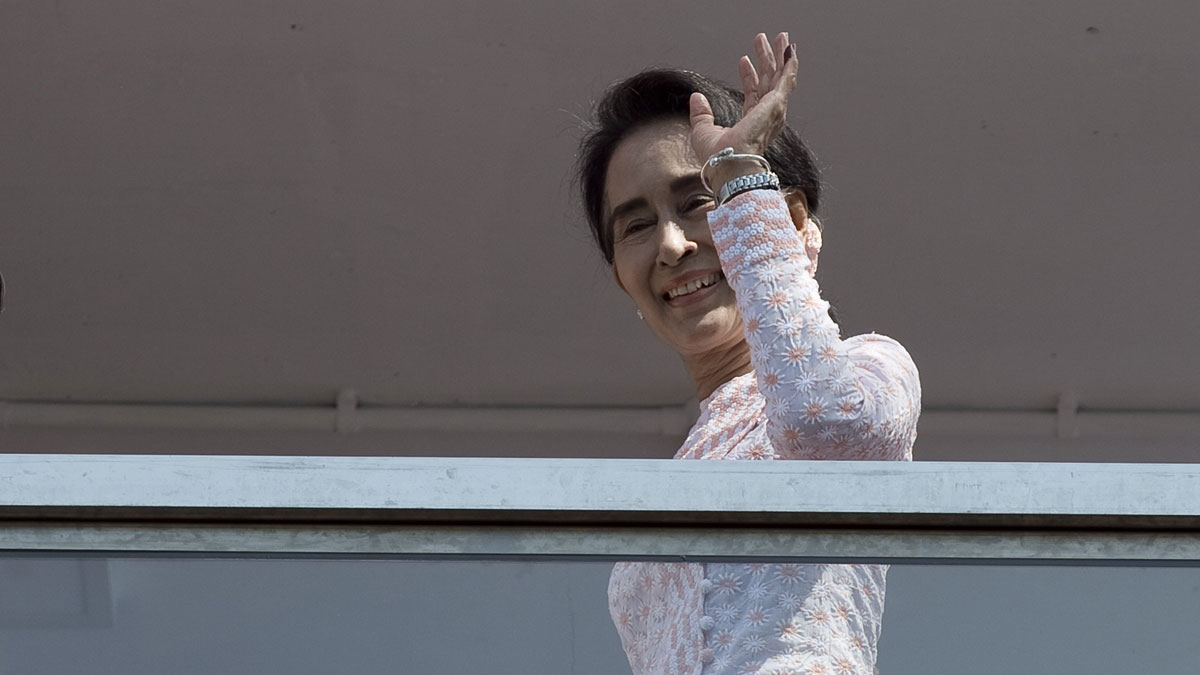Aung San Suu Kyi denies Rohingya ethnic cleansing in Myanmar
'That is too strong an expression,' says Nobel Peace Prize winner, following reports of army violence in Rakhine region

A free daily email with the biggest news stories of the day – and the best features from TheWeek.com
You are now subscribed
Your newsletter sign-up was successful
Aung San Suu Kyi has denied there is ethnic cleansing of the Rohingya Muslim group in Myanmar, despite widespread reports to the contrary.
"I don't think there is ethnic cleansing going on," she told the BBC. "I think ethnic cleansing is too strong an expression to use for what is happening."
The Nobel Peace Prize winner, who now effectively leads the country where she spent 15 years under house arrest, has been criticised for her handling of the crisis in the Muslim-majority Rakhine region, where it is alleged the Rohingya people have been murdered, raped and tortured by security forces.
The Week
Escape your echo chamber. Get the facts behind the news, plus analysis from multiple perspectives.

Sign up for The Week's Free Newsletters
From our morning news briefing to a weekly Good News Newsletter, get the best of The Week delivered directly to your inbox.
From our morning news briefing to a weekly Good News Newsletter, get the best of The Week delivered directly to your inbox.
The UN last month agreed to investigate the allegations, which observers say could amount to crimes against humanity.
But Aung San Suu said: "What we are trying to go for is reconciliation not condemnation. It is Muslims killing Muslims as well."
The Rohingya people have long faced violence and persecution in Myanmar, a mainly Buddhist country.
More than 75,000 have fled to neighbouring Bangladesh to escape the crackdown, recounting "grisly accounts of horrendous army abuse, including soldiers allegedly executing an eight-month-old baby while his mother was gang-raped by five security officers", says Al-Jazeera.
A free daily email with the biggest news stories of the day – and the best features from TheWeek.com
Myanmar military officials described the operation as a legitimate counter-insurgency mission, while Suu Kyi told the BBC the army was "not free to rape, pillage and torture".
She added: "They are free to go in and fight and of course, that is in the constitution… Military matters are to be left to the army."
Her remarks have provoked criticism, with a number of commentators saying she risked tarnishing her reputation.
There have been "numerous questions over her leadership and silence on persecution" since Suu Kyi's party the National League for Democracy (NLD) took power in 2015, ending years of military rule, says The Guardian.
Champa Patel, Amnesty International's regional director for south-east Asia and the Pacific, said: "This is not the change the NLD promised to deliver during last year's elections."
Fergal Keane of the BBC, who interviewed Suu Kyi, said the "human rights heroine" was "now alienated from many of her old international supporters".
He added: "Our exchange on Rakhine was polite but robust. I told her that having covered many conflicts I thought that what I'd seen in Rakhine state amounted to ethnic cleansing. Did she worry that instead of being remembered as an icon of human rights it would be as the Nobel laureate who refused to confront ethnic cleansing in her own country? No."
Suu Kyi's reticence on the term "ethnic cleansing" "may reflect her belief in the official government position that the Rohingya are not citizens but illegal immigrants from Bangladesh", says The Times.
"It may also come from a concern not to alienate the support of Burmese Buddhists, many of whom harbour resentful feelings towards Muslims."
-
 Health insurance: Premiums soar as ACA subsidies end
Health insurance: Premiums soar as ACA subsidies endFeature 1.4 million people have dropped coverage
-
 Anthropic: AI triggers the ‘SaaSpocalypse’
Anthropic: AI triggers the ‘SaaSpocalypse’Feature A grim reaper for software services?
-
 NIH director Bhattacharya tapped as acting CDC head
NIH director Bhattacharya tapped as acting CDC headSpeed Read Jay Bhattacharya, a critic of the CDC’s Covid-19 response, will now lead the Centers for Disease Control and Prevention
-
 Epstein files topple law CEO, roil UK government
Epstein files topple law CEO, roil UK governmentSpeed Read Peter Mandelson, Britain’s former ambassador to the US, is caught up in the scandal
-
 Iran and US prepare to meet after skirmishes
Iran and US prepare to meet after skirmishesSpeed Read The incident comes amid heightened tensions in the Middle East
-
 Israel retrieves final hostage’s body from Gaza
Israel retrieves final hostage’s body from GazaSpeed Read The 24-year-old police officer was killed during the initial Hamas attack
-
 China’s Xi targets top general in growing purge
China’s Xi targets top general in growing purgeSpeed Read Zhang Youxia is being investigated over ‘grave violations’ of the law
-
 Panama and Canada are negotiating over a crucial copper mine
Panama and Canada are negotiating over a crucial copper mineIn the Spotlight Panama is set to make a final decision on the mine this summer
-
 Why Greenland’s natural resources are nearly impossible to mine
Why Greenland’s natural resources are nearly impossible to mineThe Explainer The country’s natural landscape makes the task extremely difficult
-
 Iran cuts internet as protests escalate
Iran cuts internet as protests escalateSpeed Reada Government buildings across the country have been set on fire
-
 US nabs ‘shadow’ tanker claimed by Russia
US nabs ‘shadow’ tanker claimed by RussiaSpeed Read The ship was one of two vessels seized by the US military